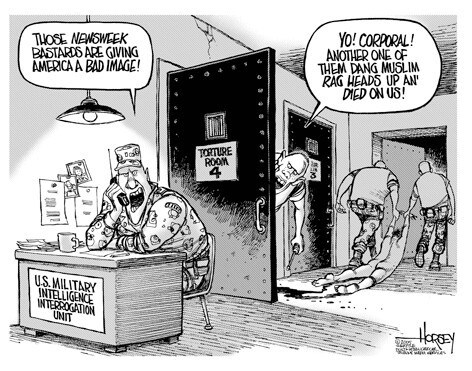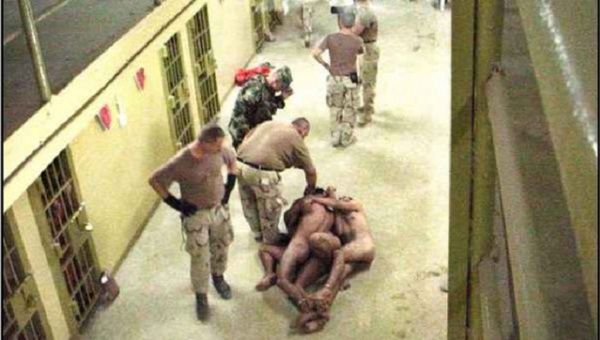Sexual Violence as a peacetime-wartime continuum: Part 4; Sexual Violence in the Global War on Terror
The Global War on Terror was not warred within the ambit of the strict interpretation of the term “armed conflict” under the Laws of War. And it couldn’t be either – for allowing the declaration and carriage of war against a non-State actor would allow the untrammeled use of force across nations without respect for sovereignty.
Yet, there was conduct quite like there is in a properly armed conflict. Weapons were used, civilian casualties occurred, prisoners of war were taken, detained and interrogated, and sexual violence was rampant.

Whether in Guantanamo Bay’s detention center or in the Abu Ghraib prison in Iraq, sexual violence was often used as a tool of torture in interrogation. In Guantanamo Bay’s detention center, sexual violence was used among several other methods of torture. It was reported that female interrogators used sexual torture to break Muslim prisoners into “confessing”. There were several reports and testimonies of released prisoners which revealed that sexual violence and sexual humiliation were used as interrogatory tactics in the detention centers. A former US soldier, Saar, who served at Guantanamo Bay also confirmed the use of sexual torture to coerce and interrogate prisoners. The testimony of a detainee, Jumah Al Dossari to Amnesty International stated that he was “interrogated hundreds of times, beaten, tortured with broken glass, barbed wire, burning cigarettes, and sexual assaults.”

At Iraq’s Abu Ghraib, a detainee once narrated having heard an Iraqi teenage boy screaming, and even seeing an army translator having sex with him while a female soldier took pictures. A series of photographs that have been kept from public viewing for good reason speaks volumes of the kind of violence that prevailed in the prison. Some of these photos reveal an American soldier raping a female prisoner, while some photos show instances of interrogators sexually assaulting prisoners with all kinds of objects including things like a truncheon, wire and a phosphorescent tube, and even a female prisoner having her clothing forcibly removed to expose her breasts. Plenty of instances of rape of female inmates at the hands of soldiers transpired, admitted to having happened even by senior officials of the US.
In peacetime, even with established rules of law, there are instances of custodial torture and sexual violence of arrested convicts and people accused of a crime. During a conflict, there is a complete breakdown of law and order, which provides a hotbed of impunity allowing torture and sexual violence to thrive. In the context of the War on Terror, there are, on some occasions, a supervening imposition of an external security sector – such as in Abu Ghraib; and on other occasions, there is a subjugation of abducted, imprisoned and extraordinarily rendered detainees, to a lawless security sector. In the case of the United States, a legal document called the Bybee Memo authorized torture in interrogation and were outlawed only seven years after they were signed. At any rate, irrespective of whether it is in war or in the interrogation of a crime of terror, an environment with frugal control over those in charge of the enforcement of the law can result in a rise in the use of sexual violence to coerce confessions.
The prevalence of sexual violence in these “wars” were also in pursuit of a policy of dominance but to serve a different end: that of making detainees and interrogated people to “confess” to having links to terror outfits. When used in interrogation, the use of rape and sexual violence are intended to humiliate the detainee into “confessing”, sometimes to crimes and offenses that they had no involvement in at all.
Read Part 1 HERE , Part 2 HERE and Part 3 HERE
About the Author:
 Kirthi Jayakumar is an activist, artist, entrepreneur, and writer from Chennai, India. She founded and runs the Red Elephant Foundation, a civilian peacebuilding initiative that works for gender equality through storytelling, advocacy, and digital interventions. She also founded and runs fynePRINT, a feminist e-publishing imprint. She is a member of the Youth Working Group for Gender Equality under the UNIANYD.
Kirthi Jayakumar is an activist, artist, entrepreneur, and writer from Chennai, India. She founded and runs the Red Elephant Foundation, a civilian peacebuilding initiative that works for gender equality through storytelling, advocacy, and digital interventions. She also founded and runs fynePRINT, a feminist e-publishing imprint. She is a member of the Youth Working Group for Gender Equality under the UNIANYD.
Kirthi is an author and released her debut novel in 2017, titled The Doodler of Dimashq. Her second book, The Dove’s Lament, made it to the final shortlist for the Muse India Young Writers’ Literary Award.
Kirthi coded an app for survivors of gender-based violence called Saahas, which works as a web and mobile app. She taught herself to code and created a web app, a mobile app, and a Facebook ChatBot to support survivors of gender-based violence across 196 countries, and to assist bystander intervention.
In 2016, Kirthi was invited to Michelle Obama’s United State of Women Summit at the White House in Washington DC, as a nominated changemaker. In 2017, she was one of the youth activists invited to attend President Obama’s Town Hall at New Delhi.
Kirthi has spoken at TEDx Chennai, addressing Peace Education as a means to end Bullying. She has also spoken at FICCI FLO, as one of the youngest speakers to address the members. She was also a speaker at the Economic Times Women’s Summit 2018. Kirthi has also had the distinction of addressing the UNV Partnerships Forum on her work as an epoch-making online volunteer with the United Nations.
Kirthi is the recipient of the US Presidential Services Medal (2012) for her services as a volunteer to Delta Women NGO, from President Barack Obama. She is the two-time recipient of the UN Online Volunteer of the Year Award (2012, 2013). She received the 2016 Orange Flower Award from Women’s Web, the 2016 World Pulse Impact Leader Award and the 2017 Empowerment Leader Award from the Dais Foundation. Her work has been published in The Guardian and the TIME Magazine. She was recognized by EuropeAid on the “200 Women in the World of Development Wall of Fame in 2016.” She received the Digital Women Award for Social Impact in 2017, from SheThePeople, the Person of the Year (Social Entrepreneur) 2017 from The Brew Magazine. Kirthi is a recipient of the Yuva Samman from MOP Vaishnav College, in January 2018. The Red Elephant Foundation received the FICCI FLO Outstanding NGO of the Year Award 2018, and the UN Online Volunteering Award 2017. Kirthi was also among the six women featured on Facebook India on International Women’s Day in 2018.




Leave a Reply